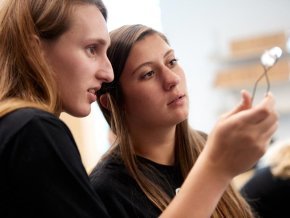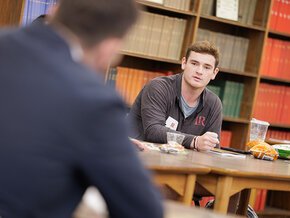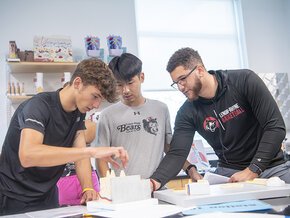
Communicating science to the public
New minor to help students develop skills to effectively communicate scientific content
As part of the university’s core curriculum, Lenoir-Rhyne undergraduate science majors take a seminar course to learn how to communicate effectively with other scientists. When it comes to translating those scientific concepts into terms and ideas their family, friends and the public can understand, students now have more course options available to them.

“We are at a point in time where there is a cultural problem between science and the general public, and I think the pandemic highlighted a lot of that,” shared Carly York, Ph.D., assistant professor in the College of Natural Science and Mathematics.
For the last two years, York has worked with students on developing their abilities in communicating science to public audiences as part of a topics course. Now that course has been expanded upon and will give students the opportunity to further develop those skills and earn an interdisciplinary minor in science communication beginning this fall.
“With the science communication minor, we are giving our natural science students a toolkit for how they can operate in the world and talk with people who don't have formal science training,” York said. “It will also help students better understand their place in the bigger picture as scientists, potentially open their eyes to other career opportunities and also just help them to navigate their own life better – be it talking with friends or coworkers.”
Students who previously took the topics course from York reiterate the importance it brings to their education and lives.
“At the end of the day if the general public does not also understand and support the scientific community, progress is halted,” shared one student in a semester evaluation. “This class has made me a more well-rounded student and has prepared me for a career after graduation."
The new minor, which requires 24-26 credit hours, brings in courses from outside the sciences to help students bridge the gap, including English, art, religion, media writing and special topics.
“I think this is the perfect kind of new program for Lenoir-Rhyne because of its collaborative approach across departments. We are taking a new approach to how we can help students be good communicators, especially in topics that may seem very divided such as religion,” York shared. “There is a lot of contention with the general public with religion and science, so it's helpful for our students to understand how they can address these major issues and help people understand that it's not so much a dichotomy as people would like to believe.”

Spring 2026 events feature a conversation on “On Tyranny,” a Mardi Gras concert highlighting American composers and a panel discussion about what binds a nation.
View More
Lenoir-Rhyne, Emory & Henry, and Mars Hill will launch a pilot program to strengthen leadership, engagement, and persistence among male students across campuses.
View More